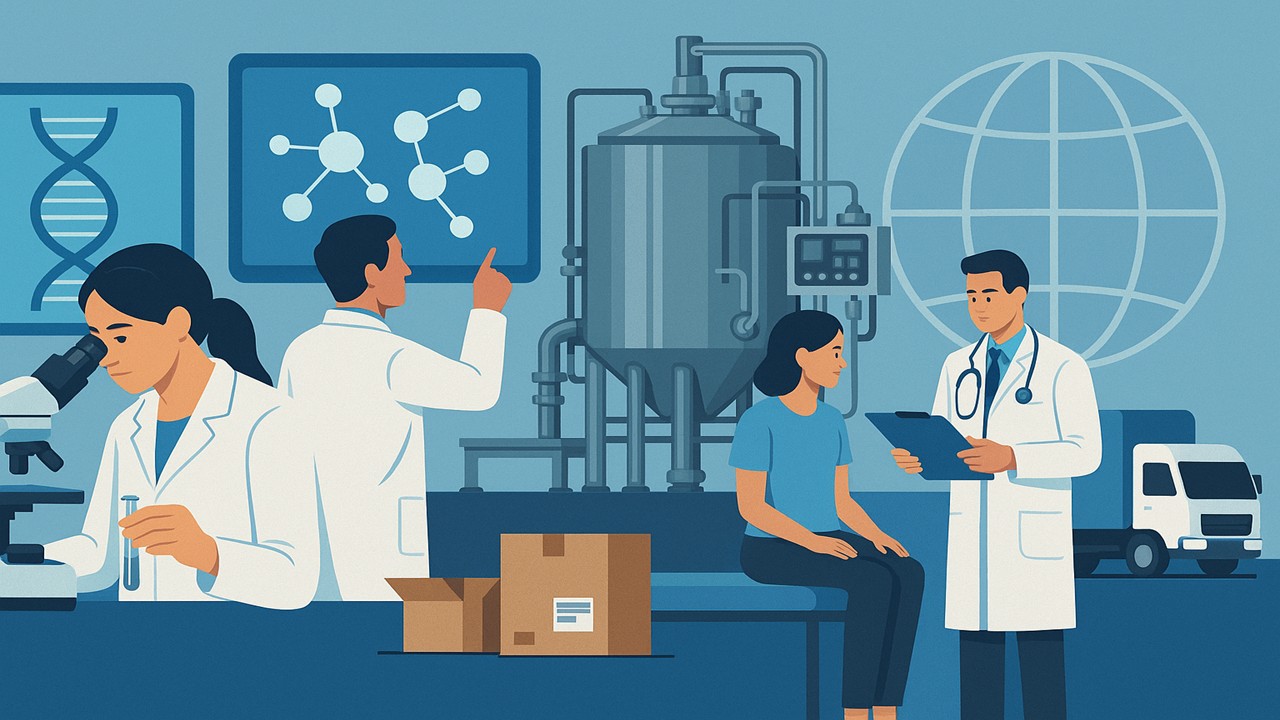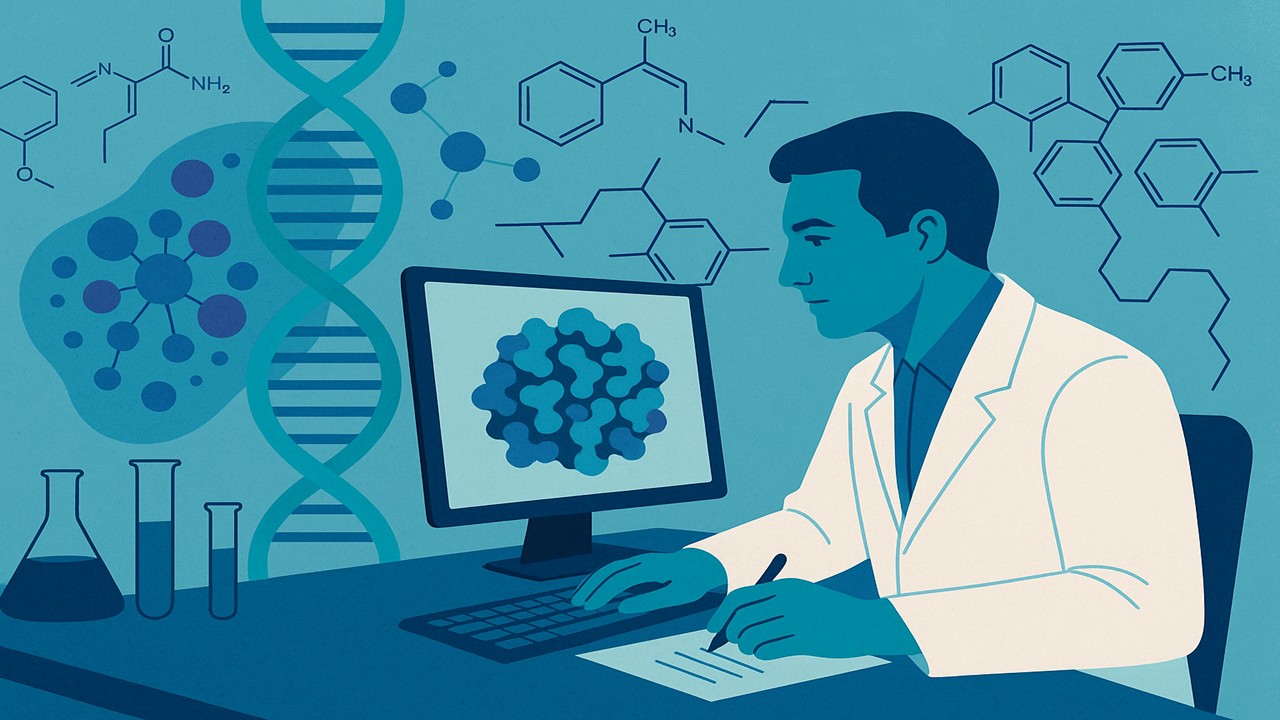About the Interviewee
Stephane Millet is the Director of Strategic Accounts and Clinical and Patient Engagement at Acolad.
With a demonstrated history in the translation and localization industry, Stephane brings a wealth of expertise in multilingualism, linguistics, translation, foreign languages, and proofreading. Armed with a BA and MA in Localization from Johannes Gutenberg University Mainz, his strong program and project management skills are evident in their ability to oversee daily operations, manage P&L, devise growth strategies, and mentor production teams.
Stephane’s current focus on Life Sciences underscores his commitment to delivering top-tier patient-centric translation services, catering to the diverse needs of healthcare organizations, medical device manufacturers, CROs, and pharmaceutical companies. His approach prioritizes clear and culturally relevant healthcare information, ensuring that patient-facing materials are accurately translated to facilitate better patient outcomes.
The Discussion
Upping Engagement: Mastering Language Proficiency and Cultural Relevance Dynamics
[Dex Marco]: It’s such a pleasure to have you here with us today, Stephane. With more than 10 years of proven track record in operations management and global strategy coordination and half a decade of dedicated provision of high-quality patient-centric translation services that meet the unique needs of healthcare organizations, medical device manufacturers, CROs, and pharmaceutical companies, what would you say drove you towards this field, and what brought you to eventually become the Director of Strategic Accounts and Clinical and Patient Engagement Solutions of Acolad?
[Stephane]: Absolutely, I’m thrilled to be here. Thanks for inviting me to join this interview. I’ve been in the industry for quite some time. I studied translation and interpretation over 15 years ago in Germany, then moved to the US and began working in various roles, including project management and localization.
When I joined Acolad (formerly Telelingua International) in 2009, I quickly encountered the challenge of balancing language proficiency and cultural relevance with the regulatory landscape. Early on, it became clear to me that translation played a crucial role. During my work with sponsors launching clinical trials, I saw firsthand how essential translation was to effectively engage with patients. However, it often puzzled me why translation was left as one of the final pieces in the process, given its critical importance in conveying information to patients.
As I advocated for the significance of translation in clinical trials, I found myself engaging in discussions with sponsors to ensure that the translated content resonated with patients and facilitated their engagement.
The Power of Human and Tech: Meticulous Translator Selection and Complementary Tools Development
[Dex Marco]: Acolad is a global leader in content and language solutions. Acolad’s mission is to empower organizations to be local anywhere by cleverly blending human creativity with technology. How does Acolad ensure patient-centricity in clinical trials through its translation services?
[Stephane]: So, when it comes to translation, we delve into various layers. It’s all about striking that perfect balance between the human touch and the scientific precision needed, especially for translating documents for clinical trials. We meticulously select translators with the right expertise and background, ensuring they’re well-versed in the intricacies of clinical trial documents, particularly those meant for patients.
But here’s where things get interesting.
At Acolad, we’re fortunate to have teams with strong technological backgrounds, enabling us to develop tools that complement our human efforts. These tools are invaluable, especially considering the complexity of managing numerous clinical trials simultaneously.
Currently, we’re handling around 150 to 180 active clinical trials spanning phases one to three across multiple regions. That’s where our tools come into play, not just for managing administrative tasks, but also for quality assurance. We’ve designed tools that meticulously scrutinize translations provided by our translators and support the oversight and review processes. This ensures consistency and compliance with local regulations and terminology databases we’ve meticulously built.
And that’s what sets Acolad apart—our unique fusion of human expertise and cutting-edge technology enables us to deliver high-quality translations tailored specifically for the field of clinical trials.
Optimizing Patient Engagement, Leveraging Technical Expertise: The Acolad DNA
[Dex Marco]: Data are generated at nearly every stage of the clinical trial life cycle. Now in line with this, I want you to describe Acolad’s approach to providing comprehensive support throughout the clinical trial lifecycle
[Stephane]: Alright, let’s break it down. It all springs from patient engagement and recruitment materials, where we step in to assist sponsors in their development and translation. These materials are crucial, crafted early on before a clinical trial even lifts off, and we’re right there at the helm, leveraging our vast database of around 20,000 linguists worldwide. They provide invaluable feedback, ensuring these materials are tailored to optimize patient recruitment and engagement.
We’re not just bystanders; we’re deeply involved in the trial design process, offering insights and recommendations to tweak and refine materials as needed.
Then comes the kickoff, where we roll up our sleeves and dive into study startup meetings, hashing out timelines and regulatory requirements alongside local trial managers. This ensures that patient-facing documents are translated and ready to go for the trial launch across different countries. Speaking of which, we understand the importance of meeting patient recruitment goals, so we’re there every step of the way, translating site agreements, and contracts, and even offering support with site recruitment through our network of clinicians.
And when it comes to translation, we’re meticulous, ensuring that documents not only read well but also comply with local regulations. Patient-reported outcomes and questionnaires? Yep, we handle those too, ensuring sponsors gather vital data efficiently. Plus, with our tools, we’re able to capture a wealth of information about each trial, from translated word counts to successful languages, all neatly stored in our database for future reference.
The Utility of Insightful Feedback for Regulatory Compliance in the Field of Life Science
[Dex Marco]: Compliance with industry regulations is non-negotiable in the fast-paced and highly regulated realm of biotech and pharma. How does Acolad’s team ensure compliance with local regulatory standards in the life sciences industry?
[Stephane]: It all circles back to our extensive network of linguists and providers dotted across the globe, each deeply ingrained in their respective countries. We’ve fine-tuned a model where, for every country, we appoint a lead linguist. These lead linguists serve as our local eyes and ears, constantly plugged into regional requirements, guidelines, and the latest publications or recommendations pertinent to our sponsors. They act as our frontline scouts, feeding back essential insights directly into our database. And that’s not all; we’ve embraced cutting-edge tech too.
With our AI tool, we’re able to sift through a wealth of publicly available information, monitoring regulatory landscapes and swiftly identifying any updates or amendments. It’s the perfect fusion of human expertise and technological prowess, allowing us to stay ahead of the curve, capturing vast amounts of regulatory data and changes within our ever-growing database.
Framing Success with Clear Expectations, Streamlining Stakeholder Communication and Involvement
[Dex Marco]: Accurate clinical trial translations are a critical ingredient in the clinical trial process. And it goes without saying that collaboration is key to the successful implementation of these services. How does Acolad foster a collaborative partnership with its translators during the translation process?
[Stephane]: We handpick translators based on their expertise and background, and the vetting process is paramount. Our vendor management team meticulously curates a roster of translators equipped with the requisite skills, ensuring our project managers have access to a talent pool that meets the project’s demands. Moreover, we conduct regular training sessions covering various aspects of clinical trial document translation. These sessions delve into the nuances of translating different document types, be it marketing materials, patient recruitment collateral, study protocols, synopsis, or informed consent forms. Equally crucial is familiarizing our translators with the regulatory landscape governing each document type. We provide comprehensive insights into the specific regulatory requirements for clinical trial documents, setting clear expectations from the outset.
At the start of a trial, we advocate for a meeting involving the sponsor, our linguists, and project managers. This collaborative session sets the stage, outlining trial specifics like the drug under investigation, target patient demographics, their socio-cultural background, and educational levels. Such details are pivotal in guiding our translators to tailor content effectively. We foster an open dialogue, even soliciting feedback from local trial managers about their preferences and requirements. This feedback loop ensures that our translators are aligned with the sponsor’s expectations, whether it’s terminology preferences, stylistic nuances, or tone adjustments.
By establishing clear expectations upfront, incorporating regulatory mandates, and accommodating sponsor preferences, we create a framework for success. Language, with its inherent subjectivity, demands this level of understanding and collaboration to ensure that all stakeholders are on the same page, ultimately leading to effective communication and successful trial outcomes.
Banking on Early Phase Innovation: Enhancing Quality Translations with Preemptive Content Curation
[Dex Marco]: As we move beyond Industry 4.0, the next phases of industrial revolution across the human enterprise including the health sciences, of course, will largely be dominated by analytics and artificial intelligence. How does Acolad utilize technology and innovation, such as generative AI, to enhance its translation services and add value to generated content?
[Stephane]: AI is no doubt a game-changer in our translation process. At Acolad, we view AI as a golden opportunity to streamline our operations and ensure compliance with regulatory frameworks. We’ve assembled a dedicated team solely focused on harnessing AI’s potential, constantly exploring new applications that could revolutionize our workflows. While some language service companies have long relied on machine translation and large language models, we’ve taken it a step further.
One area where AI truly shines is in quality control and assurance. By leveraging AI algorithms, we can swiftly verify translations, empowering our QA team to generate comprehensive reports on content accuracy and compliance before delivery to clients. These AI-powered tools, refined over the years, have significantly enhanced our efficiency and accuracy.
But we’re not stopping there. We’re venturing into uncharted territory, developing AI capabilities to evaluate content even before translation begins. Imagine this: our AI engines analyze the provided documents, offering insights into potential challenges or discrepancies. Armed with this preemptive analysis, we can proactively collaborate with clients, suggesting adjustments to ensure optimal content reception. Moreover, we’re currently exploring a proof of concept aimed at rating patient recruitment materials across various parameters. From tone appropriateness to regulatory compliance, our AI-driven tool will empower sponsors to fine-tune their materials, facilitating more effective patient engagement.
In essence, this AI-powered approach not only enhances our precision but also enables us to tailor content more effectively to our target audience, ultimately advancing the goals of our sponsors in patient recruitment and engagement. It’s an exciting journey that underscores our commitment to innovation and excellence in language services.
Back to Basics: Not Forgetting the Human-in-the-Loop Amidst Unparalleled Predictive Prowess
[Dex Marco]: Stephane, as the Director of Strategic Accounts at Acolad, you possess a unique vantage point on the intersection of technology and the clinical regulatory landscape. Looking ahead, how do you envision the future of generative AI as it shapes this landscape, and how do you anticipate your role evolving at Acolad as this transformative technology progresses?
You’ve touched on a really complex topic, predicting the future of AI. Right now, it’s like navigating through a fog; there’s so much hype surrounding AI, but at Acolad, it’s not just buzzwords—it’s tangible, it’s happening. We’re actively exploring AI’s potential in several areas, particularly within the realm of clinical trials, where precision is paramount.
Take, for instance, our work on content rating for patient recruitment materials or our application of AI in analyzing clinical trial labels. These aren’t just theoretical concepts; they’re real-world solutions aimed at enhancing our processes. As we delve deeper into AI’s capabilities, I foresee us accelerating our efforts, collaborating closely with our clients on additional proof of concepts.
However, it’s essential to approach AI with caution, especially in areas like patient recruitment, where creativity plays a crucial role. While AI can streamline repetitive tasks and standard content, it’s vital not to overlook the human touch. That’s where my role comes in—I work closely with sponsors, guiding them on where to invest their AI efforts wisely, ensuring alignment with their clinical trial objectives.
At Acolad, we foster a consultative approach, ensuring a clear understanding of AI’s possibilities while also acknowledging its limitations. By focusing on real-life applications and fostering meaningful collaborations, we’re poised to unlock AI’s true value, not just in the future, but in the weeks and months to come.
Engr. Dex Marco Tiu Guibelondo, B.Sc. Pharm, R.Ph., B.Sc. CpE
Editor-in-Chief, PharmaFEATURES
Join Proventa International’s Clinical Operations and Clinical Trial Supply Chain Strategy Meeting at Hard Rock Hotel San Diego, California on the 16th of May 2024 to learn more about Acolad’s game-changing efforts in elevating patient-centricity by leveraging translation services in clinical trials.

Subscribe
to get our
LATEST NEWS
Related Posts

Interviews
Setting the Benchmark: Shaping Analytical Standards to Accelerate Global Convergence in Biologics Quality Systems with Stephan Krause, Bristol Myers Squibb
About the Interviewee Stephan O. Krause is the Executive Director of Cell Therapy Global Quality of Bristol Myers Squibb. Stephan O. Krause, Ph.D., serves as Executive Director for Analytical Science and Technology in Cell Therapy Quality at Bristol Myers Squibb, where he leads global analytical and quality functions supporting the development, manufacture, and regulatory advancement […]

Interviews
Harmonizing Biologics Transfer: Global Regulatory Strategy, Compliance Best Practices, and Operational Alignment with Gopi Vudathala, Incyte Corporation
About the Interviewee Gopi Vudathala is the Global Head of Regulatory Affairs and Chemistry, Manufacturing and Controls at Incyte Corporation. Gopi Vudathala, Ph.D., serves as the Global Head of Regulatory Affairs and Chemistry, Manufacturing and Controls (CMC) at Incyte Corporation, a biopharmaceutical company dedicated to the discovery, development, and commercialization of proprietary therapeutics across oncology […]

Interviews
Redefining the Analytical Frontiers of Peptide Science: Innovations Shaping the Next Generation of Therapeutics with Johan Evenäs, RG Discovery
About the Interviewee Johan Evenäs is the Chief Executive Officer at RG Discovery. Johan Evenäs, Ph.D., serves as the Chief Executive Officer of RG Discovery, a life sciences company based in Lund, Sweden, specializing in drug discovery solutions including medicinal chemistry, fragment-based lead discovery, and advanced analytical services. Dr. Evenäs holds an M.Sc. in Chemical […]

Interviews
Toward Industrial Impact: Scaling the Strategic Vision for Bioprocessing Excellence with Greg Papastoitsis, Ankyra Therapeutics
About the Interviewee Gregory Zarbis-Papastoitsis is the Chief Process and Manufacturing Officer at Ankyra Therapeutics. Gregory Zarbis-Papastoitsis, Ph.D., serves as the Chief Process and Manufacturing Officer at Ankyra Therapeutics, an immuno-oncology company advancing novel intratumoral anchored cytokines currently in Phase 1 clinical trials. Dr. Zarbis-Papastoitsis holds a B.S. and Ph.D. in Biochemistry from Binghamton University, […]
Read More Articles
Myosin’s Molecular Toggle: How Dimerization of the Globular Tail Domain Controls the Motor Function of Myo5a
Myo5a exists in either an inhibited, triangulated rest or an extended, motile activation, each conformation dictated by the interplay between the GTD and its surroundings.
Designing Better Sugar Stoppers: Engineering Selective α-Glucosidase Inhibitors via Fragment-Based Dynamic Chemistry
One of the most pressing challenges in anti-diabetic therapy is reducing the unpleasant and often debilitating gastrointestinal side effects that accompany α-amylase inhibition.











